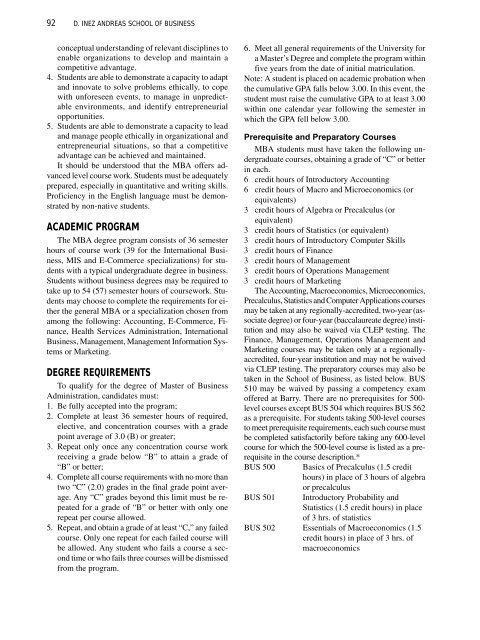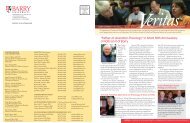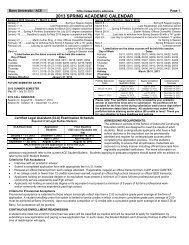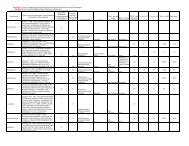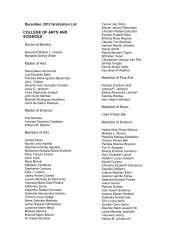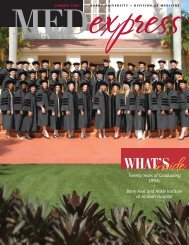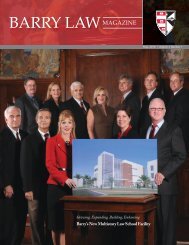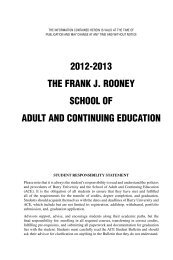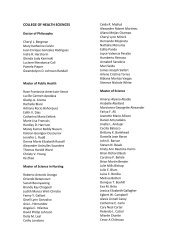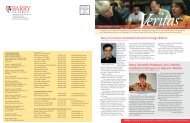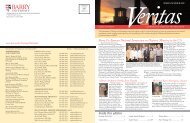2004-2005 - Barry University
2004-2005 - Barry University
2004-2005 - Barry University
Create successful ePaper yourself
Turn your PDF publications into a flip-book with our unique Google optimized e-Paper software.
92 D. INEZ ANDREAS SCHOOL OF BUSINESS<br />
conceptual understanding of relevant disciplines to<br />
enable organizations to develop and maintain a<br />
competitive advantage.<br />
4. Students are able to demonstrate a capacity to adapt<br />
and innovate to solve problems ethically, to cope<br />
with unforeseen events, to manage in unpredictable<br />
environments, and identify entrepreneurial<br />
opportunities.<br />
5. Students are able to demonstrate a capacity to lead<br />
and manage people ethically in organizational and<br />
entrepreneurial situations, so that a competitive<br />
advantage can be achieved and maintained.<br />
It should be understood that the MBA offers advanced<br />
level course work. Students must be adequately<br />
prepared, especially in quantitative and writing skills.<br />
Proficiency in the English language must be demonstrated<br />
by non-native students.<br />
ACADEMIC PROGRAM<br />
The MBA degree program consists of 36 semester<br />
hours of course work (39 for the International Business,<br />
MIS and E-Commerce specializations) for students<br />
with a typical undergraduate degree in business.<br />
Students without business degrees may be required to<br />
take up to 54 (57) semester hours of coursework. Students<br />
may choose to complete the requirements for either<br />
the general MBA or a specialization chosen from<br />
among the following: Accounting, E-Commerce, Finance,<br />
Health Services Administration, International<br />
Business, Management, Management Information Systems<br />
or Marketing.<br />
DEGREE REQUIREMENTS<br />
To qualify for the degree of Master of Business<br />
Administration, candidates must:<br />
1. Be fully accepted into the program;<br />
2. Complete at least 36 semester hours of required,<br />
elective, and concentration courses with a grade<br />
point average of 3.0 (B) or greater;<br />
3. Repeat only once any concentration course work<br />
receiving a grade below “B” to attain a grade of<br />
“B” or better;<br />
4. Complete all course requirements with no more than<br />
two “C” (2.0) grades in the final grade point average.<br />
Any “C” grades beyond this limit must be repeated<br />
for a grade of “B” or better with only one<br />
repeat per course allowed.<br />
5. Repeat, and obtain a grade of at least “C,” any failed<br />
course. Only one repeat for each failed course will<br />
be allowed. Any student who fails a course a second<br />
time or who fails three courses will be dismissed<br />
from the program.<br />
6. Meet all general requirements of the <strong>University</strong> for<br />
a Master’s Degree and complete the program within<br />
five years from the date of initial matriculation.<br />
Note: A student is placed on academic probation when<br />
the cumulative GPA falls below 3.00. In this event, the<br />
student must raise the cumulative GPA to at least 3.00<br />
within one calendar year following the semester in<br />
which the GPA fell below 3.00.<br />
Prerequisite and Preparatory Courses<br />
MBA students must have taken the following undergraduate<br />
courses, obtaining a grade of “C” or better<br />
in each.<br />
6 credit hours of Introductory Accounting<br />
6 credit hours of Macro and Microeconomics (or<br />
equivalents)<br />
3 credit hours of Algebra or Precalculus (or<br />
equivalent)<br />
3 credit hours of Statistics (or equivalent)<br />
3 credit hours of Introductory Computer Skills<br />
3 credit hours of Finance<br />
3 credit hours of Management<br />
3 credit hours of Operations Management<br />
3 credit hours of Marketing<br />
The Accounting, Macroeconomics, Microeconomics,<br />
Precalculus, Statistics and Computer Applications courses<br />
may be taken at any regionally-accredited, two-year (associate<br />
degree) or four-year (baccalaureate degree) institution<br />
and may also be waived via CLEP testing. The<br />
Finance, Management, Operations Management and<br />
Marketing courses may be taken only at a regionallyaccredited,<br />
four-year institution and may not be waived<br />
via CLEP testing. The preparatory courses may also be<br />
taken in the School of Business, as listed below. BUS<br />
510 may be waived by passing a competency exam<br />
offered at <strong>Barry</strong>. There are no prerequisites for 500level<br />
courses except BUS 504 which requires BUS 562<br />
as a prerequisite. For students taking 500-level courses<br />
to meet prerequisite requirements, each such course must<br />
be completed satisfactorily before taking any 600-level<br />
course for which the 500-level course is listed as a prerequisite<br />
in the course description.*<br />
BUS 500 Basics of Precalculus (1.5 credit<br />
hours) in place of 3 hours of algebra<br />
or precalculus<br />
BUS 501 Introductory Probability and<br />
Statistics (1.5 credit hours) in place<br />
of 3 hrs. of statistics<br />
BUS 502 Essentials of Macroeconomics (1.5<br />
credit hours) in place of 3 hrs. of<br />
macroeconomics


